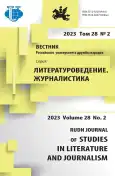Телевидение Республики Татарстан как инструмент национальной идентификации
- Авторы: Даутова Р.В.1, Тихонова О.В.2
-
Учреждения:
- Казанский Федеральный университет
- Московский государственный университет имени М.В. Ломоносова
- Выпуск: Том 28, № 2 (2023)
- Страницы: 318-332
- Раздел: Журналистика
- URL: https://journal-vniispk.ru/2312-9220/article/view/318907
- DOI: https://doi.org/10.22363/2312-9220-2023-28-2-318-332
- EDN: https://elibrary.ru/QZILOV
- ID: 318907
Цитировать
Полный текст
Аннотация
Исследование роли регионального телевидения в национальной идентификации обрело особую актуальность в контексте современных процессов медиатизации и глобализации. Теоретическое значение полученных результатов связано с выявлением приемов медиаидентификации в историческом аспекте, а также с обнаружением факторов, влияющих на процесс идентификации. Представлены итоги изучения как исторического опыта развития государственного телевидения на территории Татарстана, так и современной практики телеканала «Татарстан - Новый век», который считается в на- стоящее время главным национальным каналом в республике. Охарактеризована степень изученности темы развития регионального телевидения в России и мире в аспекте специфики национального вещания, учтены исследования, в которых затрагивается проблема этнической идентификации посредством СМИ. Использован большой массив эмпирического материала для выявления традиций и новаций в деятельности регионального телевидения, миссией которого является сохранение и развитие родного языка, культурного и исторического наследия. С помощью анализа эмпирических данных впервые показана преемственность традиций регионального телевидения относительно национального компонента.
Ключевые слова
Об авторах
Резида Вагизовна Даутова
Казанский Федеральный университет
Автор, ответственный за переписку.
Email: RVagiz@yandex.ru
ORCID iD: 0000-0003-0125-8727
доктор исторических наук, профессор, профессор кафедры телепроизводства и цифровых коммуникаций, Институт социально-философских наук и массовых коммуникаций
Российская Федерация, 420008, Казань, ул. Кремлевская, д. 18Ольга Владимировна Тихонова
Московский государственный университет имени М.В. Ломоносова
Email: tihonovao@list.ru
ORCID iD: 0000-0002-3348-4537
кандидат филологических наук, доцент, доцент кафедры телевидения и радиовещания, факультет журналистики
Российская Федерация, 125009, Москва, ул. Моховая, д. 9, стр. 1Список литературы
- Aituganova, M.L. (2012). Stages of formation of the national satellite TV channel “Tatarstan – Novy Vek” (Kazan, April 2012). Kazan Federal University. (In Russ.)
- Cardiff, D., & Scannell, P. (1987). Broadcasting and national unity. In J. Curran, A. Smith & P. Wingate (Eds.), Impacts and Influences: Essays on Media Power in the Twentieth Century (pp. 157–173). London, NewYork, Methuen: Routledge. https://doi.org/10.4324/9781315024608
- Cormack, M.J., & Hourigan, N. (2007). Minority language media: Concepts, critiques and case studies. Clevedon: Multilingual Matters LTD.
- d’Haenens, L., & Sayes, F. (Eds.) (2007). Western broadcast models. Structure, conduct and performance. Berlin, New York: Mouton de Gruyter.
- Dautova, R.V. (2019). Power and regional mass media: The history of relations. The period of “Khrushchev Thaw” in the republics of the Volga and the Urals. Kazan: Unicorn Publ. (In Russ.)
- Dolgova, Y.I. (Ed.). (2021). Television journalism. Moscow: Aspekt Press. (In Russ.)
- Ershov, Yu.M. (2012). Television of regions in search of development models. Moscow: MSU Publ. (In Russ.)
- Fatykhova, M.Kh. (2015). Propaganda editorial staff of the Kazan Television Studio as an element of Soviet ideology. Scientific Bulletin of the Belgorod State University. Series: Humanitarian Sciences, 28(24), 118–121. (In Russ.)
- Iosifidis, P., Steemers, J., & Wheeler, M. (2005). European television industries. London: British Film Institute.
- Lester, L., & Hutchins, B. (2011). Soft journalism, politics and environmental risk: An Australian story. Journalism, 13(5), 654–667. https://doi.org/10.1177/1464884911421706
- Maidurova, O.F. (2011). Information genres in regional news television programs: Current trends. St. Petersburg: SPbSU Publ. (In Russ.)
- Mongilyova, N.V. (2015). Research into functioning of the state language in the situation of mass bilingualism of North Kazakhstan using the differential technique. SAGE Open. 5(3). https://doi.org/10.1177/2158244015593120
- Raboy, M., & David, T. (2005). The trial by fire of the Canadian broadcasting corporation. lessons for public broadcasting. In G.F. Lowe & P. Jauert (Eds.), Cultural Dilemmas in Public Service Broadcasting (pp. 251–276). Goteborg: Nordicom.
- Roth-Ey, К. (2011). Moscow prime time: How the Soviet Union built the media empire that lost the cultural cold war. Ithaca, NY: Cornell University Press.
- Rzhanova, S.A. (2012). The Place of national television programs in the ethno-cultural space of the region. Humanitarian: Actual Problems of the Humanities and Education, 18(2), 103–106. (In Russ.)
- Sinclair, J., & Turner, G. (Eds.). (2004). Contemporary world television. London: British Film Institute.
- Tikhonova, O.V. (2017). Content analysis of Russian audiovisual media in national languages (on the example of Tatarstan, Bashkortostan and Chuvashia). Ethnic Journalism: History and Modernity, (10), 42–47. (In Russ.)
- Volkova, I.I., Proskurnova, E.L., & Tran Thi Thuy Dung. (2021). Prospects of news television: Materials of in-depth interviews. Nauchnyi Dialog, (3), 157–170. (In Russ.) https://doi.org/10.24224/2227-1295-2021- 3-157-170
- Vukanovich, Z. (Ed.) (2009). Television and digital media in the 21st century: New business, economic and technological paradigms. Media Art Service International.
- Vyrkovsky, A.V., & Makeenko, M.I. (2014). Regional television of Russia on the threshold of the digital era. Moscow: MediaMir Publ. (In Russ.)
- Wilke, J., Heimprecht, C., & Cohen, A. (2012). The geography of foreign news on television: A comparative study of 17 countries. The International Communication Gazette, 74(4), 301–322. https://doi.org/10.1177/1748048512439812
- Zvik, V.L. (2006). National identification of TV channels in the era of globalization. Electronic media in the context of new challenges of the time. St. Petersburg: ITMO University. (In Russ.)
Дополнительные файлы









